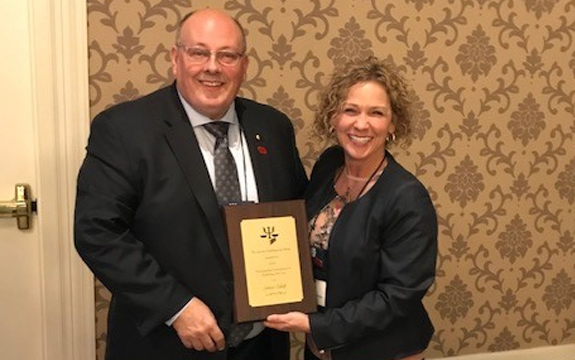Swinburne’s James Ogloff recognised with international award

In Summary
- Professor James Ogloff wins prestigious international award from the American Psychology-Law Society.
- It recognises Professor Ogloff’s long and distinguished contribution to law and psychology.
- The award is rarely granted, only being made 15 times in 30 years.
Swinburne’s Foundation Director of the Centre for Forensic Behavioural Science, Professor James Ogloff, has received a prestigious international award for his distinguished contribution to psychology and the law.
Professor Ogloff was presented with the rarely-bestowed Distinguished Contributions to Psychology and Law Award by the American Psychology-Law Society (AP-LS) at its 2018 annual congress in Memphis, Tennessee, on 9 March. The AP-LS is the largest association in forensic psychology or law and psychology internationally.
The award is not granted every year and is reserved for individuals who have made distinguished theoretical, empirical and applied contributions to the field of psychology and law. The award has only been made 15 times in more than 30 years and past recipients include a US Supreme Court Judge and an Attorney General. It was presented by Associate Professor Eve Brank, PhD, President of the AP-LS.
Professor Ogloff says that it was a “great surprise and a great honour” to receive the award.
“The award really reflects on my good fortune of working with and mentoring many colleagues,” he added.
During the award address, Professor Ogloff noted that he has had 240 co-authors for his 300 publications, including 66 doctoral students. He also focused on his lifelong work using research and legal policy to enhance mental health services for prisoners.
For contributions “so unusual”
Dr Stephane Shepherd a senior lecturer in the Centre for Forensic Behavioural Science, nominated Professor Ogloff for the award which he said was only given to individuals whose contributions are “so unusual” they merit special commendation. Professor Michael Daffern, a professor in the CFBS, also joined in the nomination and helped introduce him at the conference.
“In other words, this is essentially a lifetime achievement award for an esteemed and highly respected performer in this discipline,” says Dr Shepherd.
“I nominated Jim as he has had a truly outstanding and decorated career to date and his influence on the field has been substantial. When I called upon leaders in the field to support the nomination, their support was overwhelming.”
“He is a Forensic Psychologist, Lawyer and Academic. He has taught, practised and conducted research of a high quality in Canada, the USA and Australia.
“The fact that many of his former students are now distinguished leaders in the field in their own right, is a testament to Jim's expertise, guidance and mentorship. He truly is a pioneer and world leader in our discipline.”
Professor Ogloff launched Swinburne’s Centre for Forensic Behaviour Science as its foundation director and since 2001 has also been Executive Director of Psychological Services and Research in the Victorian Institute of Forensic Mental Health (Forensicare).
Long and distinguished career
Over this career, Professor Ogloff has led the development of three psychology and law or forensic doctoral programs and has supervised more 60 doctoral students to completion.
At Swinburne, Professor Ogloff led the establishment of the graduate program in forensic mental health and behavioural science which now has more than 160 students enrolled every semester from the disciplines of mental health and criminal justice.
Professor Ogloff undertakes psychological assessment and treatment of offenders and forensic patients in Victoria and he has given expert evidence in criminal trials throughout Australia, Canada, New Zealand, Indonesia and the US in the areas of mental health, sexual offending, prediction of violence and risk, the death penalty and jury behaviour.
He regularly assesses some of Australia’s most notorious criminals.
In 2015, Professor Ogloff was appointed a Member of the Order of Australia (AM) for significant service to education and to the law as a forensic psychologist, as an academic, researcher and practitioner.

